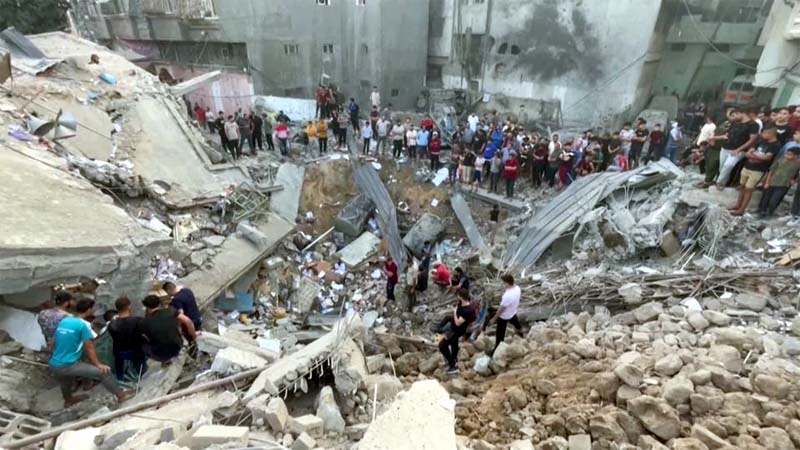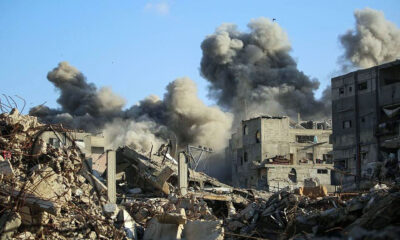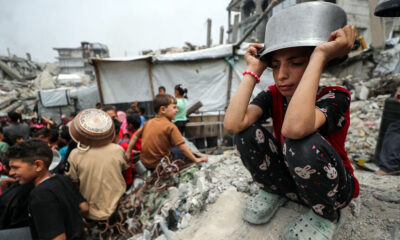International
US weapons used in Israeli attack on Gaza school – Report

US weapons used in Israeli attack on Gaza school – Report
Among the rubble of the United Nations-run al-Sardi school in central Gaza’s Nuseirat refugee camp were the remnants of the weapons that killed at least 40 Palestinians.
The Israeli attack in the early hours of Thursday gave the displaced people sheltering in the school no prior warning. Fourteen children were killed, as well as nine women and at least 74 other people were wounded. The weapons used to carry out the attack – according to an Al Jazeera analysis of the fragments left behind – were US-made.
An inertial measurement unit from the missile, used to aid with precision targeting, was manufactured by Honeywell, an American conglomerate that specialises in the design and delivery of sensors and guidance devices that are used in a variety of military weapons.
Al Jazeera’s Sanad verification unit discovered that one of the fragments found in Nuseirat bore the manufacturer and category number HG1930BA06, tracing it back to Honeywell. HG1930 refers to the specific sensor manufactured by the company.
The same part was found after the Israeli bombing of a Palestinian home in Shujayea, Gaza in 2014. The two pieces, in the most recent and the 2014 bombing, have the same manufacturer part number inscribed on them.
“We see also other numbers like the MFR, HG 1930 and then BA 06. This is the manufacturer part number that provides more specific details about the component of the missiles,” Elijah Magnier, an independent military and political analyst, told Al Jazeera. “Now, if you look at the manufacturer identification … it is a format used by the aerospace and defence sector in the United States connected to Honeywell.”
READ ALSO:
- CBN will implement bold economic reforms, says Cardoso
- 200 babies born one month in Benue IDP camp – Report
- US sanctions Palestinian group under decree used to target Israeli settlers
“Honeywell is known for the supply of IMU in the various military applications, and particularly the guided missiles that it has been providing to the Israeli Air Force since the year 2000.”
Al Jazeera has reached out to Honeywell for comment, but has yet to receive a response.
Israeli attacks on UN spaces have become commonplace during Israel’s war on Gaza, which has now killed more than 36,000 Palestinians.
The United States has been criticised for its role in supporting Israel, and particularly its continued supply of weapons.
Major rights groups have repeatedly accused Israel of violating international law, and Israel is currently facing a genocide case at the International Court of Justice. The International Criminal Court’s chief prosecutor has also sought arrest warrants for Prime Minister Benjamin Netanyahu and Defence Minister Yoav Gallant for their actions in Gaza.
In May, a US government report found possible Israeli violations of international law in Gaza, but stopped short of identifying the violations that would end its continuing military aid. US President Joe Biden has threatened to stop the supply of some offensive weapons to Israel if it continues its Rafah operation, but has not carried out the threat, despite Israel pressing on in the area, which lies in southern Gaza.
Central Gaza under attack
Central Gaza has most recently come under severe Israeli bombardment, which Palestinians have described as similar to the early days of the war.
The attack on al-Sardi school in Nuseirat is part of that assault.
“The bombardment came from here,” said Naim al-Dadah, a survivor of the attack.
“We were sleeping. The flying metal reached the roof on the other side and all these nets landed over there, on the other side. What happened to us is beyond anyone’s imagination.”
Other witnesses say the attack tore people to pieces. Survivors collected body parts, including those of many children, until the early hours of the morning. Weapon debris was scattered throughout shattered rooms and the blood-stained mattresses. Multiple rooms were targeted, though the building’s structure remained intact.
Israel’s Arabic language spokesperson Avichay Adraee, claimed the UN school was targeted because it housed a Hamas command post and fighters involved in the Palestinian group’s October 7 attack on Israel, which killed 1,139 people. He also claimed Israel took several steps to minimise the possibility of civilian casualties. The director of Hamas’s government media office, Ismail al-Thawabta, rejected Israel’s claims.
In April, the media outlet +972 Magazine reported that Israel uses an artificial intelligence-targeting system called Lavender in its Gaza-bombing campaign. The report quoted Israeli military officials who said that the system generates targets to kill. For low-level Hamas targets, the report said, the army was permitted to kill 15 to 20 civilians. An attack on a more senior Hamas official with the rank of battalion or brigade commander was used to justify the killing of more than 100 civilians.
US weapons used in Israeli attack on Gaza school – Report
SOURCE: AL JAZEERA
International
UK Court Hands Life Sentence to Nigerian Teen for Knife Attack Killing

UK Court Hands Life Sentence to Nigerian Teen for Knife Attack Killing
A Nigerian teenager residing in the UK, Jackson Uwagboe, has been sentenced to life imprisonment for the murder of 21-year-old Robert Robinson, following a brutal knife attack in Lewisham, London. The sentencing was delivered at the Old Bailey on Wednesday.
The Metropolitan Police confirmed that 19-year-old Uwagboe of Hamilton Street, Lewisham, was found guilty of murder on Tuesday, 10 February 2026, in a case stemming from a dispute over a stolen bicycle. The court ruled that Uwagboe must serve a minimum of 21 years before he can be considered for parole.
Uwagboe’s co-defendant, Eromosele Omoluogbe, 24, was earlier convicted of perverting the course of justice after assisting Uwagboe in attempting to flee to Nigeria via Heathrow Airport.
READ ALSO:
- Ogun Gov Rewards Nigeria’s Best Primary School Teacher with Car, Bungalow
- Police Bust Gang Armoury, Arrest Two Suspects in Delta
- Peter Obi Launches ‘Village Boys Movement’ to Rival Tinubu’s City Boys Ahead of 2027
Prior to this sentencing, two other men, Ryan Wedderburn, 18, and Kirk Harris, had already been convicted and handed life sentences in May 2025 for their roles in the same murder.
Detective Inspector Neil Tovey, who led the investigation, described the incident as a “brutal and sustained attack”. He said, “Robert was subjected to a brutal and sustained attack by a group of men armed with knives. He was unarmed, already wounded, and on the ground when Uwagboe attacked him. Today’s verdict brings justice for Robert Robinson and his family.”
The case has drawn attention to youth violence, knife crime, and gang-related activity in London, as well as the challenges faced by law enforcement in preventing violent disputes over seemingly minor disputes such as bicycle theft.
The sentencing underscores the UK judicial system’s approach to serious violent crimes, ensuring that perpetrators face long-term incarceration while providing a clear minimum term before parole consideration.
UK Court Hands Life Sentence to Nigerian Teen for Knife Attack Killing
International
UK-Based Nigerian Gets 13-Year Jail Term for Forcing Girlfriend to Abort Pregnancy

UK-Based Nigerian Gets 13-Year Jail Term for Forcing Girlfriend to Abort Pregnancy
A UK-based Nigerian man, Adeleke Adelani, has been sentenced to more than 13 years’ imprisonment for unlawfully aborting the pregnancy of his former partner after coercing her to take abortion medication on Valentine’s Day.
The offence occurred in 2020 when Adelani, then 28 years old, deceptively invited the woman — whose identity is legally protected — to his residence in Letterkenny under the guise of discussing the future of her pregnancy. Evidence before the court showed that the victim was nine weeks pregnant at the time of the incident.
Prosecutors told the court that upon her arrival, Adelani threatened the woman with violence and forced her to ingest five tablets of misoprostol, a drug used for medical abortions, thereby causing the unlawful termination of the pregnancy. The court heard that the defendant had researched the medication in advance and acted deliberately. The victim later contacted authorities, leading to Adelani’s arrest by Irish police.
READ ALSO:
- Lawmaker Jailed for Mocking President in Facebook Post
- Police to Arrest TikToker Mirabel After She Recants False Rape Claim
- Tinubu Reduces Reliance on U.S, Strengthens Defence Partnerships With Turkey, EU
At the time of the sentencing, Adelani was already serving a separate seven-year prison sentence for an unrelated offence. He had initially been due to stand trial last year but pleaded guilty before jury selection began, accepting responsibility for the charges brought against him.
During the sentencing hearing at the Letterkenny Circuit Court, the victim delivered a powerful impact statement, explaining that although she had chosen to forgive Adelani, the consequences of his actions would remain with her for life.
“I have forgiven the defendant,” she told the court. “That forgiveness does not mean what he did was acceptable. It means I refuse to let what he did continue to control my heart and my life. When he wrongfully imprisoned me and caused the termination of my nine-week pregnancy, he took far more than my freedom. He took my child. He took my sense of safety. He took a future that I had already begun to plan and love.”
In a letter read aloud in court, Adelani apologised to the victim, accepted full responsibility for his actions, and expressed remorse for the pain and trauma he caused.
Delivering judgment, John Aylmer described the crime as deliberate, premeditated, and deeply traumatic, stressing that it involved coercion, abuse, and a serious violation of trust. The judge sentenced Adelani to 11 years in prison, with the final two years suspended, for causing the unlawful termination of a pregnancy, and an additional five years, with the last 12 months suspended, for assault causing harm.
The sentences are to run concurrently, adding to Adelani’s existing term and resulting in an overall prison sentence exceeding 13 years. The case has reignited debate in Ireland and internationally about reproductive coercion, domestic abuse, and violence against women, with legal observers describing it as one of the most serious cases of its kind in recent years.
UK-Based Nigerian Gets 13-Year Jail Term for Forcing Girlfriend to Abort Pregnancy
International
Epstein, Ex-Israeli PM Named in Alleged Profiteering From Boko Haram Crisis

Epstein, Ex-Israeli PM Named in Alleged Profiteering From Boko Haram Crisis
A new investigative report by Drop Site News has alleged that the late American financier Jeffrey Epstein and former Israeli prime minister Ehud Barak leveraged Nigeria’s long-running Boko Haram insurgency to pursue commercial, security, and strategic interests in the country.
According to the investigation, emails released by the United States Department of Justice in 2018 show Epstein acting as a behind-the-scenes facilitator in discussions involving Jide Zeitlin, then chairman of Nigeria’s Sovereign Investment Authority, and Sultan Ahmed bin Sulayem, former chairman of DP World. The exchanges allegedly focused on attempts to secure control of key shipping terminals in Lagos and Badagry, following unsuccessful negotiations with successive Nigerian administrations dating back to 2005.
The report claims DP World was unwilling to invest in a proposed industrial zone in Nigeria without full or majority control of the adjoining port infrastructure, a demand that reportedly stalled the deal for years. Epstein, who died in a New York jail in 2019 while awaiting trial, is alleged to have helped revive talks by brokering introductions and strategic conversations.
READ ALSO:
- CBN Policies, Foreign Inflows Drive Naira to Two-Year Peak
- Edo Governor Okpebholo Names Mercy Johnson-Okojie Special Adviser
- Many Feared Dead as Suspected Lakurawa Militants Attack Kebbi Communities
Drop Site News further reported that bin Sulayem resigned on February 13 after renewed scrutiny of his past links to Epstein resurfaced publicly, intensifying attention on the historical port negotiations and the role of foreign intermediaries in Nigeria’s maritime sector.
Beyond logistics and port infrastructure, investigators highlighted what they described as near-daily correspondence between Epstein and Barak after the former Israeli leader left public office. Barak, who served as Israel’s defence minister until 2013, allegedly sought to deepen Israeli-Nigerian security cooperation, using Nigeria’s counter-insurgency battle as an entry point for Israeli-linked security, energy, and technology investments.
The report said Barak later relied on security networks in Nigeria to promote Israeli defence and surveillance firms. In 2015, Barak and a partner invested $15 million in FST Biometrics, founded by former Israeli intelligence chief Aharon Ze’evi Farkash. The firm’s Basel biometric system, originally deployed at Israel-Gaza crossings, was subsequently marketed in Nigeria as a counter-terrorism solution.
According to the investigation, the biometric technology was introduced at Babcock University as protection against Boko Haram threats, while also being pitched to African governments for broader identity management and population-control applications.
The report further cited a 2020 World Bank-supported initiative involving Israel’s National Cyber Directorate and Toka Group, a cyber-intelligence company co-founded by Barak. The partnership was presented as contributing to Nigeria’s national cybersecurity framework, but Drop Site News argued it also deepened Israeli corporate access to sensitive security architecture.
In its conclusion, the investigation alleged that a network of security interventions, port negotiations, and technology investments enabled Epstein and Barak to profit from instability associated with the Boko Haram conflict, while simultaneously advancing Israeli commercial and strategic interests in Nigeria. The outlet stressed that these claims are based on document reviews and correspondence, framing them as allegations rather than established legal findings.
Epstein, Ex-Israeli PM Named in Alleged Profiteering From Boko Haram Crisis
-

 Politics2 days ago
Politics2 days agoPeter Obi Launches ‘Village Boys Movement’ to Rival Tinubu’s City Boys Ahead of 2027
-

 International3 days ago
International3 days agoCanada Opens New Express Entry Draw for Nigerian Workers, Others
-

 News2 days ago
News2 days agoPolice to Arrest TikToker Mirabel After She Recants False Rape Claim
-

 International2 days ago
International2 days agoEpstein, Ex-Israeli PM Named in Alleged Profiteering From Boko Haram Crisis
-

 metro3 days ago
metro3 days agoOsun Awards 55.6km Iwo–Osogbo–Ibadan Road Project to Three Contractors
-

 Education9 hours ago
Education9 hours agoUTME: JAMB Clarifies Position on Hijab During Biometric Capture
-

 Politics3 days ago
Politics3 days agoUpdated: Rivers Senator Mpigi Barinada dies at 64
-

 metro3 days ago
metro3 days agoOndo Monarch Killed as Bandits Strike Akure North















